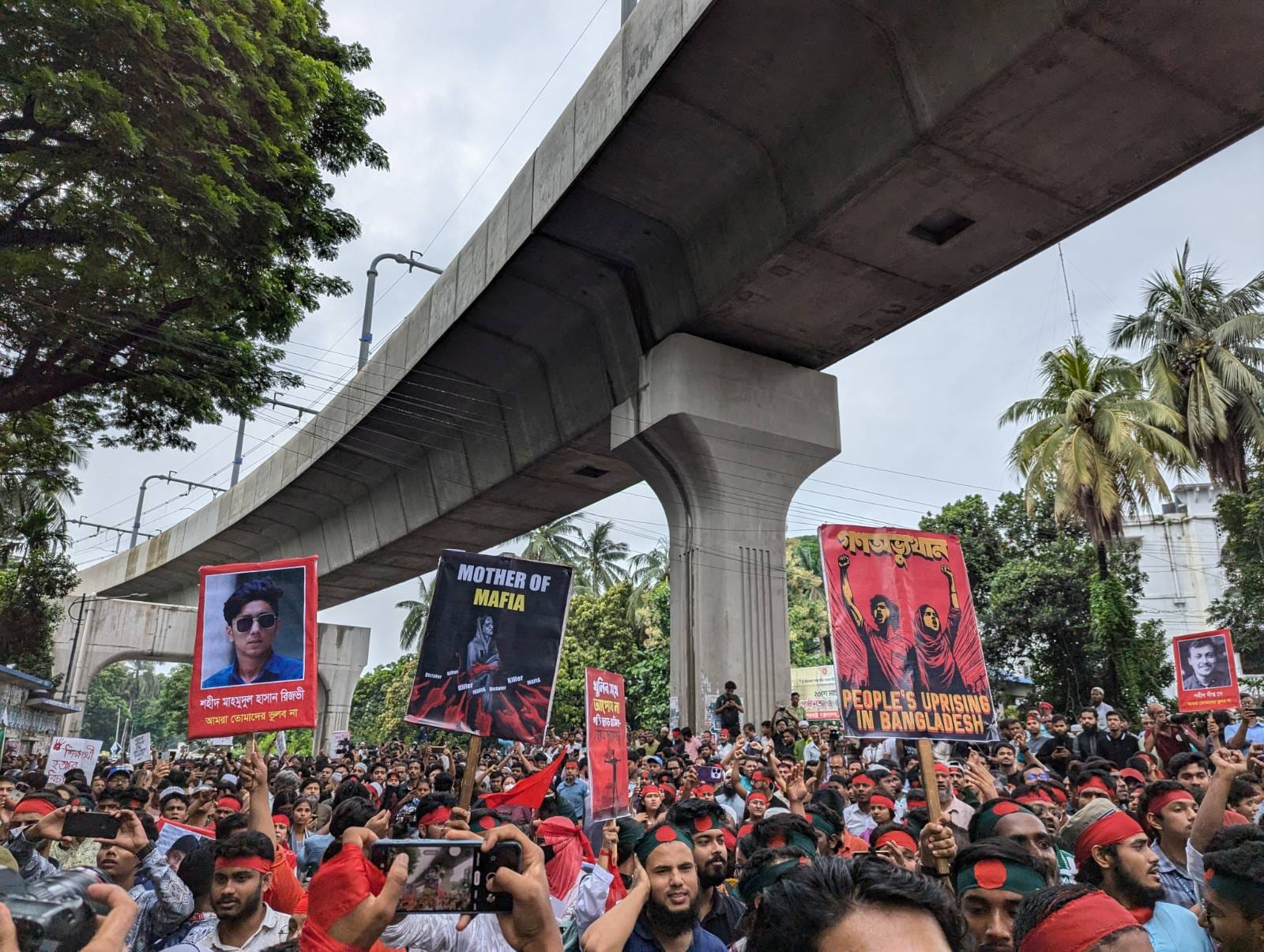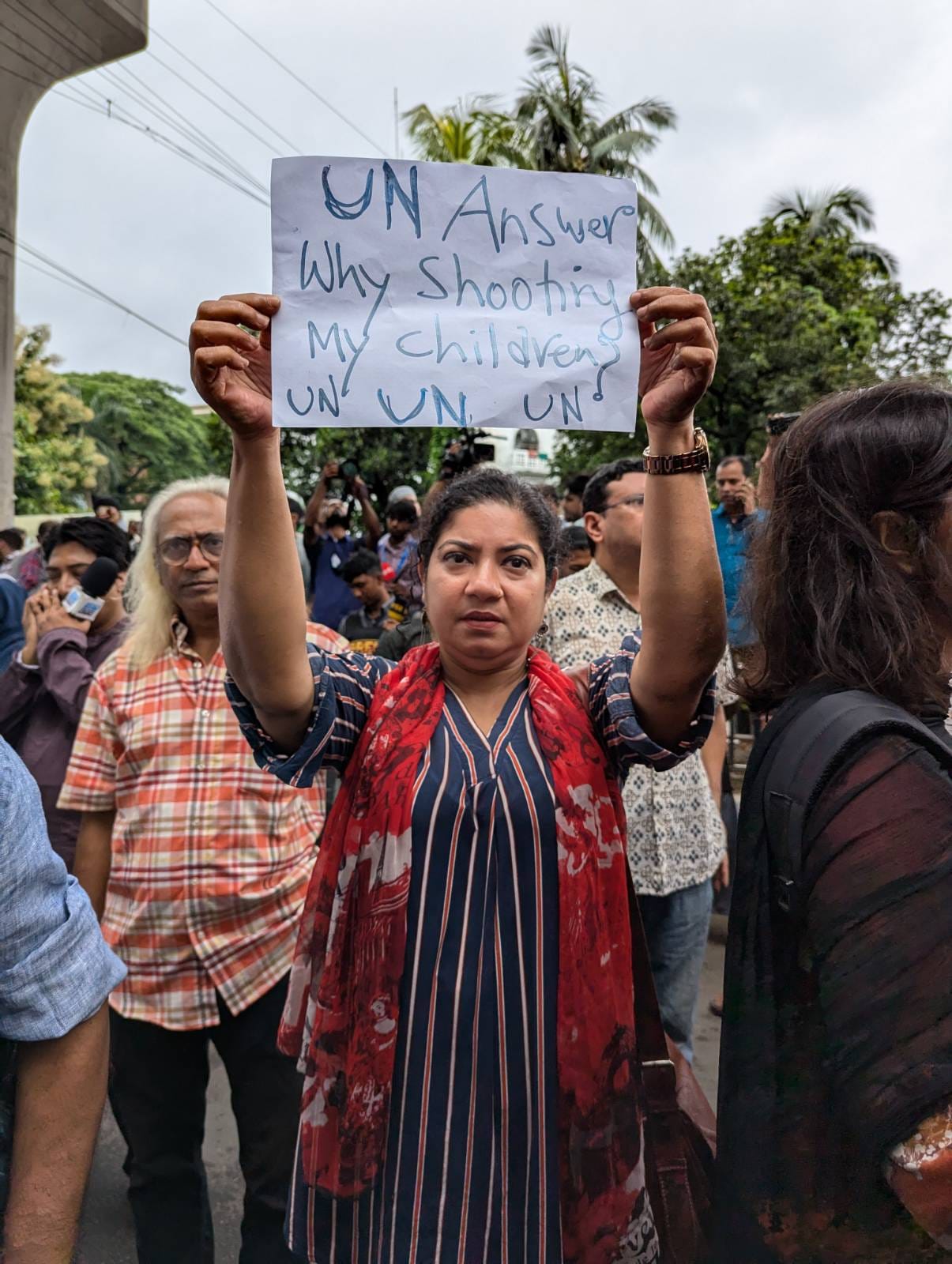
Protesters gather in Dhaka, Bangladesh on August 2nd 2024
The protests are unlikely to stop. They are triggered by a deep, understandable emotional response in the country to the killing by the government’s law enforcement authorities of at least 200 people, most of whom were students and ordinary citizens.
The killings have scarred the nation. There is huge anger. The government’s response has been unbelievably crude—blaming the opposition, calling them “terrorists,” and not taking any responsibility. People have had enough of the government’s lies. They don’t believe the governing Awami League party anymore, partly because they have seen what has happened in front of their eyes or in videos that literally show security forces shooting at and killing innocent protesting students and others in cold blood.
Many people who used to support the party and spoke poorly about the political opposition now strongly feel that the Awami League has no moral right to remain in power.

In the past, the Awami League government’s narratives against the opposition parties hit home and were often accepted by large sections of civil society. The government has effective control of television, and there are only a few independent newspapers, which helps it control the narrative. But the situation is different now. It feels like the Awami League has “lost the room” in the sense that it has lost the country. It does not matter what the government says anymore, as other than their own party loyalists, no one believes it.
In this situation, can the government maintain its hold on power?
It could, of course, do an about-turn.
It could agree to a United Nations investigation, accept its own responsibility for the killings, and beg forgiveness from the country. But this would represent such a huge U-turn for the government that it is very difficult to see the prime minister—who has repeatedly blamed the deaths and violence on the opposition (referring to them as “terrorists”)—taking such a step. Things have got so bad for the government that completely changing tack now would not likely regain sufficient popular support. People simply think that a government that has killed so many people has no moral right to remain in power. It is as simple as that.
Clearly, if Bangladesh were like Iran or other similarly highly repressive countries, the government could use increased repression to control the population and end the protests. But Bangladesh is not Iran—and whilst the law enforcement authorities have been very loyal to the Awami League, they are unlikely to be willing to take part in the levels and length of repression necessary to calm the political situation.
The government could seek to bring the army back into the equation, but to do so would be politically risky and, unless this is a permanent state, will only succeed until the army returns to barracks, when the protests would simply resume.
The Bangladesh government is now looking towards India, the Awami League’s principal benefactor. The Indian government will no doubt offer to do many things to help the Awami League and is no doubt doing them now. However, in the end, in the context of these huge protests, India can only provide limited support for the Awami League—and also does not want to be seen to be on the wrong side if the Awami League’s government were to fail. India will be pragmatic. India will provide as much political support as it can until it realises that doing so would not be in its interest.
The liberal democratic international community (which I will describe as “the West”) now has an important role to play. It has to try and persuade the Awami League that it is in their best interests now to resign and allow some form of peaceful transfer of power to an army-backed government, as a prelude to free and fair elections in the near future. Ideally, the army would not be involved, but to avoid a bloodbath, there is probably no way a transition to another government could take place without them. The country’s army is the only institution that can play that “independent” role.
The prime minister, though, is not going to listen to the West. The only way that Sheikh Hasina will even think about taking such a drastic step is if India pushes her in this direction. So, the liberal democratic international community must pressure India.
However, right now, there is no reason to think that “the West” is thinking like this at all. Although the EU has issued a strongly worded statement, no other country has. Instead, they have condemned violence in a general manner rather than the law enforcement killings in particular and urged the government to comply with human rights norms.
This mealy-mouthed posture is not new; it reflects how the West has dealt with the Awami League’s move to authoritarianism over the last ten to fifteen years. Since coming to power fairly in 2009, it has avoided free and fair elections three times since then (either through rigging the polls or failing to take the necessary steps that allowed the political opposition to take part). Yet, the West has supported Sheikh Hasina and the Awami League, seeing the party, despite its autocracy and history of terrible human rights violations, as providing the country with stability and economic development.
However, the costs of the West’s acquiescence are now coming home to roost. The people of the country are finally asserting themselves. If the West is concerned about “stability” in Bangladesh—if it wants to avoid the risks of widespread violence—it should now support the Awami League handing over power.
Right now, the only question seems to be how long the Awami League will remain in power. There is a kind of popular revolution taking place in the country. The people are saying to Sheikh Hasina that she should read the writing on the wall, both metaphorically and literally. It says: Resign.●
source : netra.news









